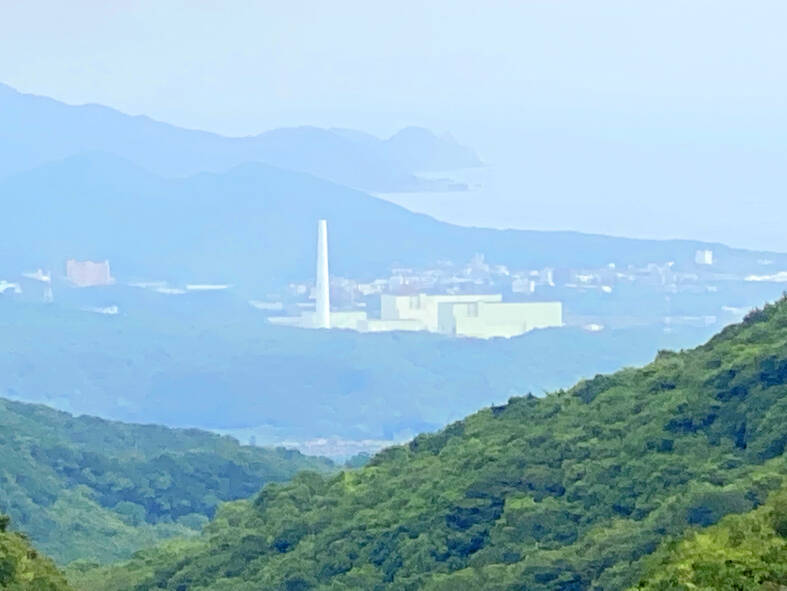Taiwan should not phase out nuclear energy, which is essential to the nation’s bid to boosting the share of renewable energy in its energy mix and achieving carbon neutrality by 2050, Taiwan People’s Party (TPP) Chairman and presidential candidate Ko Wen-je (柯文哲) said yesterday.
The Democratic Progressive Party has turned a blind eye to the global trend of moving toward net zero emissions and is instead clinging on to natural gas, itself a fossil fuel, which now makes up 50 percent of Taiwan’s energy mix, Ko said on a social media.
This problem can be remedied by greatly boosting the percentage of renewables among Taiwan’s energy sources and pushing back the time line to phase out nuclear energy, Ko said.

Photo: Tsai Yun-jung, Taipei Times
He recommended “extending the service life” of the Ma-anshan Nuclear Power Plant in Pingtung County’s Ma-anshan (馬鞍山), which is set to be fully decommissioned in May 2025, and that of the Guosheng Nuclear Power Plant in New Taipei City’s Wanli District (萬里), even though the plant was decommissioned in March.
He also called for security concerns surrounding the shuttered Fourth Nuclear Power Plant in New Taipei City’s Gongliao District (貢寮) to be addressed as soon as possible.
Following the 2011 Fukushima nuclear disaster, Taiwan that same year ordered a safety inspection of the Fourth Nuclear Power Plant.
The Ministry of Economic Affairs in July 2014 announced that the safety inspection report deemed the nuclear power plant to be “safe.”
However, the Atomic Energy Council (AEC) in August that year cited 23 “inconclusive” items and nine items that still require the submission of follow-up information by the state-run utility Taiwan Power Co.
The issues prevented the Fourth Nuclear Power Plant from receiving the permit for the use of fuel rods and led the AEC to declare that the plant had failed to meet safety standards on numerous occasions over the years.
In April 2014, then-premier Jiang Yi-huah (江宜樺) ordered that it be shuttered amid strong public opposition to its construction.
In 2021, a referendum on its unsealing and relaunching failed to pass after 3.8 million people voted for and 4.26 million voted against the proposal.
Ko recently proposed a goal to increase the share of renewable energy sources from the current level of 8 to 9 percent to 40 percent by 2030, but has yet to propose a detailed energy mix.
Achieving carbon neutrality by 2050 is a global trend, and many businesses have joined the RE100 initiative to achieve 100 percent renewable energy, Ko said.
Many Taiwanese businesses hope to jump on the bandwagon and have been trying to purchase renewable energy, only to be told that there is none available, he said.
This highlights Taiwan’s continual shortage of renewable energy, which has disadvantaged many companies, he said.
This has not only led to a large volume of carbon emissions, but also poses a risk to the nation’s energy supply due to fluctuating prices on a global level, Ko added.

Nipah virus infection is to be officially listed as a category 5 notifiable infectious disease in Taiwan in March, while clinical treatment guidelines are being formulated, the Centers for Disease Control (CDC) said yesterday. With Nipah infections being reported in other countries and considering its relatively high fatality rate, the centers on Jan. 16 announced that it would be listed as a notifiable infectious disease to bolster the nation’s systematic early warning system and increase public awareness, the CDC said. Bangladesh reported four fatal cases last year in separate districts, with three linked to raw date palm sap consumption, CDC Epidemic Intelligence

Two Taiwanese prosecutors were questioned by Chinese security personnel at their hotel during a trip to China’s Henan Province this month, the Mainland Affairs Council (MAC) said yesterday. The officers had personal information on the prosecutors, including “when they were assigned to their posts, their work locations and job titles,” MAC Deputy Minister and spokesman Liang Wen-chieh (梁文傑) said. On top of asking about their agencies and positions, the officers also questioned the prosecutors about the Cross-Strait Joint Crime-Fighting and Judicial Mutual Assistance Agreement, a pact that serves as the framework for Taiwan-China cooperation on combating crime and providing judicial assistance, Liang

Reports of Taiwanese going missing, being detained or interrogated, or having their personal liberties restricted in China increased about fourfold annually last year, the Mainland Affairs Council (MAC) said yesterday. Last year, 221 Taiwanese who traveled to China were reported missing, were detained and interrogated, or otherwise had their personal freedom restricted, up from 55 the previous year, the council said. Reopening group tours to China would be risky, as it would leave travelers with no way to seek help through official channels after Beijing shut down dialogue between the associations tasked with handling cross-strait tourism, the MAC said. Taipei’s Taiwan Strait Tourism

SHIFT: Taiwan is evolving from a transit stop into a tourist destination, with more international travelers willing to spend on tours, dining and cultural activities Taiwan rose three places in the World Tourism Barometer to 36th globally in 2024, with international tourism revenue of US$10.028 billion, the Tourism Administration said on Monday. The UN Tourism Organization publication said that its focus has switched from whether a country has returned to pre-COVID-19 levels of tourism to the amount spent by a tourist during an overseas trip. The nation last year welcomed 8.57 million international tourists, about 9 percent more than in 2024, with most tourists coming from Japan, South Korea, and Hong Kong and Macau, all of which accounted for at least 1 million tourists each. During the first